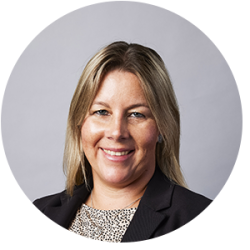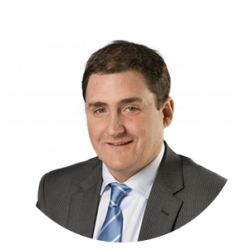Focused on driving the net zero transition and climate resilience in your organisation? This course is for you. We’ll help you apply systems thinking to understand the broader financial system challenges, learn about tools to help you think about climate risk, and drive change in your sphere of influence.
Why take this course?
Climate change and the transition to net zero creates risk and opportunity for the finance sector. Finance professionals need to know how to navigate the complexities of climate risk and opportunity in their sectors, organisations and roles. Systems thinking is essential to navigate such complex and uncertain territory and identify strategic leverage points.
With mandatory reporting of climate-related financial risk now being implemented, it’s more important than ever that finance professionals build their knowledge and skills in this rapidly evolving area of expertise.
This course is presented by leading experts in sustainable finance and systems thinking. We’ll draw on the latest knowledge from industry alongside research-supported strategies for systemic and organisational change. Participants will gain a solid grounding in trends, norms and expectations for their role and organisation and a deeper appreciation of the financial system’s potential in responding to the climate crisis. You will engage with peers around key issues and learn practical tools, challenge your thinking, and enhance your capacity to lead and motivate change.
You'll walk away with
an understanding of the science and impacts of climate change and leading-edge developments, challenges and opportunities in the sustainable finance landscape, including the latest international and domestic developments.
practical and relevant skills to identify and assess climate risks and opportunities for your role, organisation and sector.
the ability to draw on systems thinking and anticipatory tools to think critically and creatively about your organisation’s role in the transition to net zero.
enhanced individual capacity to reflect, identify and evaluate practical actions to lead and motivate change.
connection with other sustainable finance leaders and experts to expand your network and opportunities for collaboration.
Who is this course for?
Finance professionals working in sectors including: | Finance professionals working in roles including: |
|
|
Why study with us?
UTS is recognised as the world’s leading university in our pursuit of sustainability through partnerships. In this course, experts from the Institute for Sustainable Futures will facilitate a learning experience that leverages the university’s role in the broader financial system and our established expertise in systems thinking and foresight. Expect best-in-class content in a forum that invites unbiased discussion, emerging insights, and a learning experience that promotes critical thinking and reflexivity.
Speakers and facilitators
Alison Atherton Research Director, UTS Institute for Sustainable Futures Alison has a background in social sciences, chartered accountancy audit and advisory, and over a decade of experience in sustainability research and consultancy. Alison has extensive experience in project direction, planning, management and implementation, including large, complex, multi-partner projects. Her clients include all levels of government and the not-for-profit and private sectors. | |
Gordon Noble Research Director, UTS Institute for Sustainable Futures Gordon has worked across financial systems in a variety of capacities over a thirty-year career including in frontline roles in banking, superannuation, investment management, employee relations and policy/research. He was one of the first employees of the United Nations backed Principles for Responsible Investment, founded what is now the Principles for Responsible Investment Academy and in 2020 co-authored the Australian Sustainable Finance Roadmap released by the Australian Sustainable Finance Initiative. | |
Prof. Chris Riedy Associate Director Learning and Development, UTS Institute for Sustainable Futures Chris is a transdisciplinary action researcher with a focus on sustainability transformations. He uses sociological and political theory, narrative theory and futures thinking to design, facilitate and evaluate practical experiments in transformative change towards sustainable futures. |
Course program
Time | Session title | Description |
Day 1 |
| Pressures and Transition in the Finance System |
9.00am – 9.40am | Setting the scene | The morning will start with introductions and an overview of the course. Participants will begin to learn about systems thinking concepts and understand why they are essential for responding to climate risk. |
9.40am – 12.45pm (including morning tea break) | Understanding climate risk and the need for the net zero transition
| The morning sessions will explore climate science and impacts, the biggest sources of emissions globally and in Australia, different types of climate risk relevant to businesses, and the role of climate scenarios in assessing climate risk. Gaming and scenario activities will be used to deepen understanding, and case studies will illustrate concepts in practice. |
12.45pm – 1.45pm: Lunch | ||
1.45pm – 5.00pm (including afternoon tea break) | Understanding the net zero transition as systems transformation | The afternoon sessions will introduce systems thinking concepts and tools and how they important for thinking about climate risk and opportunity. Participants will learn about how large systems transform and the importance of considering systems leverage points for transformation. Activities will allow participants to explore current responses to climate risk in the financial system and whether the most impactful leverage points are being addressed. |
Networking drinks and guest speaker
| ||
Day 2 |
| Navigating and Leading Transition |
9.00am – 12.45pm (Including morning tea break) | Using systems and futures thinking tools to navigate climate risk and opportunity | In the morning sessions, participants will learn about carbon budgets, sectoral decarbonisation pathways, climate finance opportunities and climate financing mechanisms. From this, they will gain an understanding of the scale of transformation required and the investable opportunities and mechanisms that can support the transition to net zero. Participants will gain practical experience in using systems thinking tools like Multi Level Perspective and 3 Horizons frameworks to consider responses to the climate challenge. Activities will include systems mapping and diagramming to understand the current system and visioning to explore what the financial system will look like when the net zero transition is well underway. |
12.45pm – 1.45pm: Lunch | ||
1.45pm – 5.00pm (including afternoon tea) | Navigating the net zero transition – from innovation to action | In the afternoon sessions, we will combine the learning from the previous sessions into activities to explore what it will take to achieve the net zero transition. Participants will explore the innovations and changes that are needed to realise the future vision, and how organisations can position themselves using the 12 Transformative Outcomes from the Multi Level Perspective Framework. The day will end with a session to identify individual actions and commitments, reflect on what participants have learned throughout the two day course, and how systems thinking can be applied in their daily work. |





